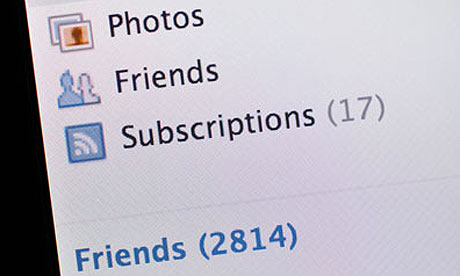 |
Many teenagers have thousands of Facebook friends. How
Many of these people are actually your friends though?
|
When you think of social media, the first thing
that probably comes to mind is interacting with friends or peers. One
of the main purposes of having a Facebook is to be able to stay connected with
friends through pictures, and messaging. It is a great way to keep long
distance relationships, and keep in touch with old friends who have moved away,
or gone off to college.
Are long distance friendships really friendships
though?
Think about how many friends you actually have.
If you had to write a list of all of the friends you know you can count
on how long would it be? The average number of Facebook friends a person has is
190, however very few people actually have
that many real friends. In fact 31% of social network users have friends that they have never even personally met!
 |
This graph displays the average number of friends
a Facebook user has. (Graph citation)
|
Experts worry that spending too much time online
keeps us from living our real lives. "It's
great to have a lot of Facebook friends, but how many of those will friends
will show when you're really in trouble?" asks Michael J Bugeja.
Even though people might use the internet
to keep in touch with friends who they cannot physically see anymore,
after a while are they real friends? People can change, and these
changes can be hidden through the screen of a computer. Although
social media sites are a way that many people keep relationships over distance,
these relationships can lead to a fake sense of closeness after some time.
For some teens, it seems as if facebook is a big competition of who can have the most friends.
A 16-year-old student was interviewed from Chicago
high school about the issue, and said that "It's like a big popularity contest — who
can get the most friend requests"
Teens that are a part of social media sites such as
MySpace or Facebook tend to have thousands of friends to try to keep up with
the competition of who can have the most “friends.” But the question is: are
these people really your friends? Many teens tend to accept friend requests
regardless if they know the person or not, just to add more friends.
As teens begin to accept friend requests from strangers, what they may not realize is their potential for abuse.
People make fake accounts with false information
including pictures that may be appealing to people looking for either friends,
or sexual relationships. MySpace
was forced to cancel 90,000 accounts on its site that were directly linked by
authorities to sex
offenders.
You can be whoever you want to be on the internet. People making these fake accounts can look like someone that you would be friends with, but in reality be the complete opposite. Last October, in Minnesota, a man was charged for raping a woman on their first date after meeting on the Internet. He slipped drugs into her drink that caused her to pass out.
These statistics may seem alarming, but this is reality. So next time you go to accept a friend request, think to yourself: Is this person REALLY your "friend"?
The next post will talk about the serious dangers that social media has on teenagers well-being, and mental health.
No comments:
Post a Comment